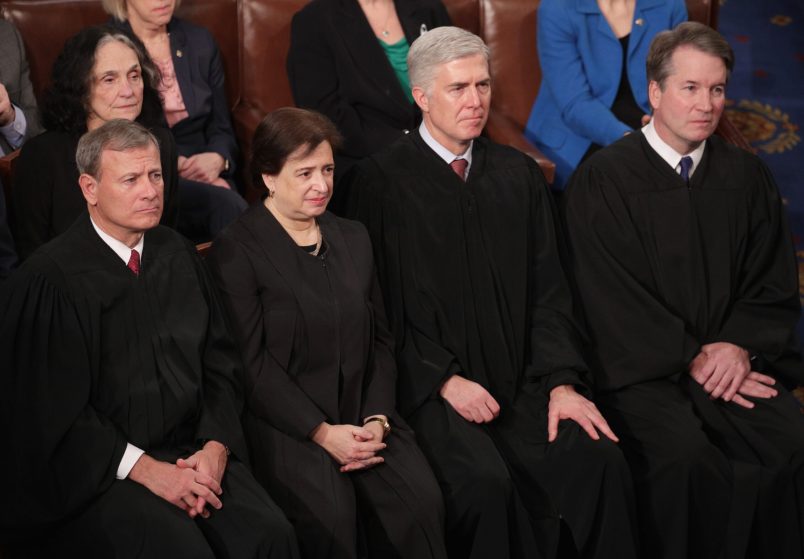The Supreme Court blocked a Biden administration rule requiring workers at large employers be vaccinated or receive regular COVID-19 tests on Thursday.
But the high court let a separate mandate affecting health care workers stay in force pending further arguments. That ruling affects health care workers at facilities that receive funding from Medicare and Medicaid, a population of around 17 million.
The employer order would have covered 80 million people.
The employer mandate, enacted by the Occupational Safety and Health Administration (OSHA), fell in a 6-3 decision. The health care worker mandate survived in a 5-4 ruling.
In OSHA, the court found that the mandate likely exceeded the agency’s authority.But in keeping the rule from being enforced, the majority — conservative justices — treaded further into vaccine-skeptical language.
The court described the rule as “a significant encroachment into the lives — and health — of a vast number of employees,” without mentioning the lives — and health — of employees working adjacent to the unvaccinated.
The court added that because COVID-19 is so ubiquitous in the United States, it is not OSHA’s place to impose a mandate for a hazard that does not exist solely in the workplace.
“That kind of universal risk is no different from the day-to-day dangers that all face from crime, air pollution, or any number of communicable diseases,” the ruling reads. “Permitting OSHA to regulate the hazards of daily life — simply because most Americans have jobs and face those same risks while on the clock — would significantly expand OSHA’s regulatory authority without clear congressional authorization.”
Around 844,000 Americans have died of COVID-19 since February 2020. Patients, sick with other ailments around the country, currently face delayed treatment due to COVID-inducted staffing shortages at hospitals and lack of bed space, again taken up by COVID patients.
A concurring opinion written by Justice Gorsuch and co-signed by Justices Alito and Thomas went even further, saying that only the states — and explicit congressional action — could respond to the COVID-19 pandemic.
“The question before us is not how to respond to the pandemic, but who holds the power to do so,” that opinion reads. “The answer is clear: Under the law as it stands today, that power rests with the States and Congress, not OSHA.”
A dissent from the three liberal justices reminded the court that COVID-19 “causes harm,” and that in workplaces, “individuals have little control, and therefore little capacity to mitigate risk.”OSHA is responsible for regulating workplaces, the dissent reads, so it should be able to enforce rules that limit hazards in the workplace, like COVID-19.
“As disease and death continue to mount, this Court tells the agency that it cannot respond in the most effective way possible,” the opinion concludes.
In the health-care workers case, Justices Thomas and Alito wrote dissents, to which Justices Barrett and Gorsuch concurred. They would have blocked the COVID-19 vaccine mandate for health-care workers at institutions receiving federal funds from going forward.
Alito’s dissent accused CMS of departing from administrative procedure, while Thomas took on the burden of arguing that the federal government lacked the authority to issue the mandate in the first place.
“Without legal basis, the Court usurps a decision that rightfully belongs to others. It undercuts the capacity of the responsible federal officials, acting well within the scope of their authority, to protect American workers from grave danger.”
The decision comes after expedited oral arguments during which the conservative justices expressed deep skepticism about the Biden administration’s use of agency power.
Chief Justice John Roberts and Justice Neil Gorsuch called agencies’ various mandates a “workaround” for the administration’s inability to get a more comprehensive ban through Congress. Justice Amy Coney Barrett questioned the authority of an agency specifically charged with maintaining the “health and safety” of its patients.
Experts, having tracked a growing hostility in the rightwing judicial world to agency authority, characterized these arguments as an indicator of how aggressively the conservative bench would stymy the Biden administration’s attempt to make policy unilaterally. With an already nonfunctional Senate and potential Republican congressional takeover looming, the court’s hostility to agency power could paralyze the administration.
The arguments also put on display some antagonism to the vaccines themselves.
After insisting thrice, almost biblically, that he wasn’t saying the vaccines are unsafe, Justice Samuel Alito claimed: “Some people who are vaccinated … will suffer adverse consequences.”



